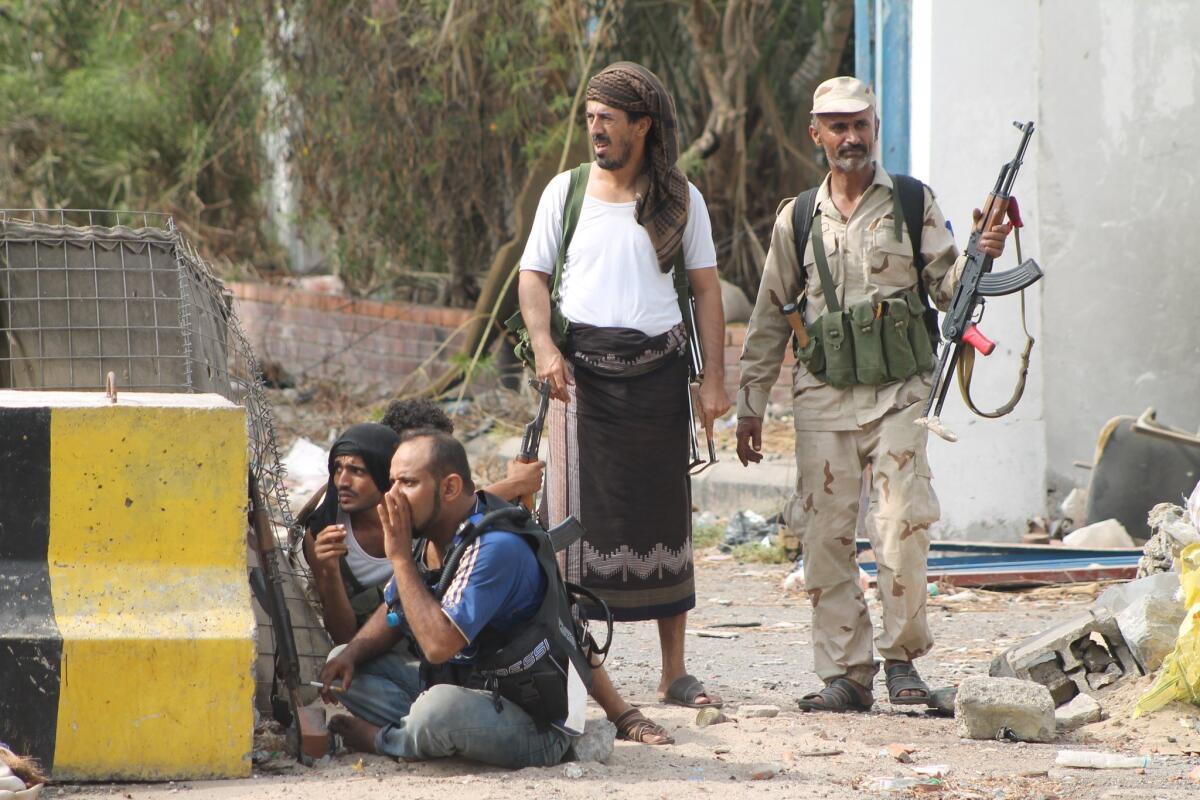Yemen’s ousted leaders claim their fighters have retaken city of Aden

Fighters opposed to Shiite Muslim Houthi rebels gather Thursday along the frontline of fighting in the port city of Aden, Yemen.
- Share via
Reporting from Sana, Yemen — Yemen’s Saudi-backed government claimed Friday its fighters had seized control of the key southern city of Aden in what would be loyalist forces’ first real strategic victory in nearly four months of fighting.
But the battle has exacted a terrible humanitarian toll in what was already the Arab world’s poorest country.
Troops loyal to Yemen’s internationally recognized president, Abdu Rabu Mansour Hadi, declared Friday they had driven out the last of the Shiite Muslim Houthi rebels from the city’s principal precincts after wresting control of the airport and main port earlier in the week. Witnesses said some stragglers remained, however.
Yemen’s exiled vice president and prime minister, Khalid Bahah, declared early Friday on Twitter that Aden was “completely” in the hands of pro-government forces. Officials said many Houthi fighters had been captured, and asked the International Committee of the Red Cross to take custody of them.
It was the Houthis’ advance on the southern seaport of Aden that forced Hadi into exile – and triggered the Saudi-led military intervention, which began March 26 with waves of punishing airstrikes across Yemen. With the exception of a brief humanitarian pause, and a short-lived truce attempt last week, the bombardment has continued relentlessly.
The campaign has had little military effect but has brought Yemen’s population of nearly 26 million to its knees.
More than 3,000 people, many of them civilians, have been killed, by the count of international agencies and the United Nations. Vital infrastructure is smashed, millions of people have been displaced, drinkable water is in short supply, hospitals have closed their doors, and disease and hunger are stalking cities and villages alike.
The fighting in Yemen -- pitting the Saudi-led military coalition and its allies against the Houthis and forces aiding them -- has thrown into sharp relief the region’s sectarian tensions.
Sunni Muslim-ruled Saudi Arabia regards the Houthis as a proxy of Shiite rival Iran, which it considers with alarm to have expansionist ambitions. Those fears were heightened this week by the signing of a nuclear accord between the U.S. and five other world powers and the Tehran government, which a number of Sunni Arab governments worry will enhance Iran’s ability to support partisans in conflicts across the Mideast.
The Houthis painted their quitting of Aden as a deliberate withdrawal, while insisting that parts of the city were still contested. Days of pitched battles in inner districts left dozens dead – preceded by weeks of close-quarters fighting with heavy weaponry that decimated landmark areas and left residents starving and terrified.
The Saudi-led coalition wants to restore Hadi to power, but it was not clear whether Yemenis would welcome his homecoming at this point. Many are furious over his role in triggering the destructive bombardment that has taken place while he and members of his government sheltered in the Saudi capital, Riyadh.
Several key ministers returned this week to Aden, which was Hadi’s last redoubt before fleeing the country in March. The capital, Sana, had fallen to the Houthis last year.
Friday marked the start of the Muslim feast of Eid al-Fitr, signaling the end of the holy month of Ramadan, which is observed with fasting and prayer. In the early hours of the day, Yemenis received separate Eid greetings from Hadi, from former strongman Ali Abdullah Saleh, who brought many government troops and weapons to the Houthi camp, and from rebel leader Abdulmalik Houthi.
Hadi claimed that Aden would be a gateway through which more territory would be “liberated” by government loyalists. Saleh called for all parties to stop fighting. Houthi urged the movement’s insurgents to strike along Yemen’s long border with Saudi Arabia.
The rebels have harried Saudi troops along the frontier for months and managed to fire at least one Scud missile toward a big Saudi air base.
Before the current outbreak of fighting, Yemen was the hub of a U.S. drone war on Al Qaeda in the Arabian Peninsula, the local franchise of the terror network and regarded as one of its most dangerous. The fighting has curtailed but not halted the drone campaign, although Al Qaeda has exploited the chaos to seize territory and has sought to muster Sunni tribal support against the Shiite Houthis.
Special correspondent Al-Alayaa reported from Sana and Times staff writer King from Cairo.
Follow @laurakinglat on Twitter for news out of the Middle East
More to Read
Sign up for Essential California
The most important California stories and recommendations in your inbox every morning.
You may occasionally receive promotional content from the Los Angeles Times.













